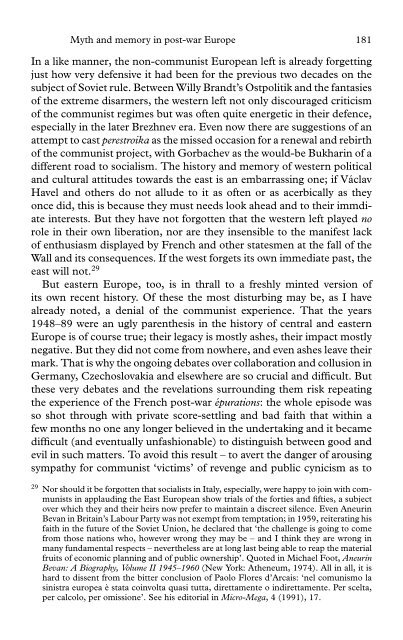Memory and Power in Post-War Europe: Studies in the Presence of ...
Memory and Power in Post-War Europe: Studies in the Presence of ...
Memory and Power in Post-War Europe: Studies in the Presence of ...
You also want an ePaper? Increase the reach of your titles
YUMPU automatically turns print PDFs into web optimized ePapers that Google loves.
Myth <strong>and</strong> memory <strong>in</strong> post-war <strong>Europe</strong> 181<br />
In a like manner, <strong>the</strong> non-communist <strong>Europe</strong>an left is already forgett<strong>in</strong>g<br />
just how very defensive it had been for <strong>the</strong> previous two decades on <strong>the</strong><br />
subject <strong>of</strong> Soviet rule. Between Willy Br<strong>and</strong>t’s Ostpolitik <strong>and</strong> <strong>the</strong> fantasies<br />
<strong>of</strong> <strong>the</strong> extreme disarmers, <strong>the</strong> western left not only discouraged criticism<br />
<strong>of</strong> <strong>the</strong> communist regimes but was <strong>of</strong>ten quite energetic <strong>in</strong> <strong>the</strong>ir defence,<br />
especially <strong>in</strong> <strong>the</strong> later Brezhnev era. Even now <strong>the</strong>re are suggestions <strong>of</strong> an<br />
attempt to cast perestroika as <strong>the</strong> missed occasion for a renewal <strong>and</strong> rebirth<br />
<strong>of</strong> <strong>the</strong> communist project, with Gorbachev as <strong>the</strong> would-be Bukhar<strong>in</strong> <strong>of</strong> a<br />
different road to socialism. The history <strong>and</strong> memory <strong>of</strong> western political<br />
<strong>and</strong> cultural attitudes towards <strong>the</strong> east is an embarrass<strong>in</strong>g one; if Václav<br />
Havel <strong>and</strong> o<strong>the</strong>rs do not allude to it as <strong>of</strong>ten or as acerbically as <strong>the</strong>y<br />
once did, this is because <strong>the</strong>y must needs look ahead <strong>and</strong> to <strong>the</strong>ir immdiate<br />
<strong>in</strong>terests. But <strong>the</strong>y have not forgotten that <strong>the</strong> western left played no<br />
role <strong>in</strong> <strong>the</strong>ir own liberation, nor are <strong>the</strong>y <strong>in</strong>sensible to <strong>the</strong> manifest lack<br />
<strong>of</strong> enthusiasm displayed by French <strong>and</strong> o<strong>the</strong>r statesmen at <strong>the</strong> fall <strong>of</strong> <strong>the</strong><br />
Wall <strong>and</strong> its consequences. If <strong>the</strong> west forgets its own immediate past, <strong>the</strong><br />
east will not. 29<br />
But eastern <strong>Europe</strong>, too, is <strong>in</strong> thrall to a freshly m<strong>in</strong>ted version <strong>of</strong><br />
its own recent history. Of <strong>the</strong>se <strong>the</strong> most disturb<strong>in</strong>g may be, as I have<br />
already noted, a denial <strong>of</strong> <strong>the</strong> communist experience. That <strong>the</strong> years<br />
1948–89 were an ugly paren<strong>the</strong>sis <strong>in</strong> <strong>the</strong> history <strong>of</strong> central <strong>and</strong> eastern<br />
<strong>Europe</strong> is <strong>of</strong> course true; <strong>the</strong>ir legacy is mostly ashes, <strong>the</strong>ir impact mostly<br />
negative. But <strong>the</strong>y did not come from nowhere, <strong>and</strong> even ashes leave <strong>the</strong>ir<br />
mark. That is why <strong>the</strong> ongo<strong>in</strong>g debates over collaboration <strong>and</strong> collusion <strong>in</strong><br />
Germany, Czechoslovakia <strong>and</strong> elsewhere are so crucial <strong>and</strong> difficult. But<br />
<strong>the</strong>se very debates <strong>and</strong> <strong>the</strong> revelations surround<strong>in</strong>g <strong>the</strong>m risk repeat<strong>in</strong>g<br />
<strong>the</strong> experience <strong>of</strong> <strong>the</strong> French post-war épurations: <strong>the</strong> whole episode was<br />
so shot through with private score-settl<strong>in</strong>g <strong>and</strong> bad faith that with<strong>in</strong> a<br />
few months no one any longer believed <strong>in</strong> <strong>the</strong> undertak<strong>in</strong>g <strong>and</strong> it became<br />
difficult (<strong>and</strong> eventually unfashionable) to dist<strong>in</strong>guish between good <strong>and</strong><br />
evil <strong>in</strong> such matters. To avoid this result – to avert <strong>the</strong> danger <strong>of</strong> arous<strong>in</strong>g<br />
sympathy for communist ‘victims’ <strong>of</strong> revenge <strong>and</strong> public cynicism as to<br />
29 Nor should it be forgotten that socialists <strong>in</strong> Italy, especially, were happy to jo<strong>in</strong> with communists<br />
<strong>in</strong> applaud<strong>in</strong>g <strong>the</strong> East <strong>Europe</strong>an show trials <strong>of</strong> <strong>the</strong> forties <strong>and</strong> fifties, a subject<br />
over which <strong>the</strong>y <strong>and</strong> <strong>the</strong>ir heirs now prefer to ma<strong>in</strong>ta<strong>in</strong> a discreet silence. Even Aneur<strong>in</strong><br />
Bevan <strong>in</strong> Brita<strong>in</strong>’s Labour Party was not exempt from temptation; <strong>in</strong> 1959, reiterat<strong>in</strong>g his<br />
faith <strong>in</strong> <strong>the</strong> future <strong>of</strong> <strong>the</strong> Soviet Union, he declared that ‘<strong>the</strong> challenge is go<strong>in</strong>g to come<br />
from those nations who, however wrong <strong>the</strong>y may be – <strong>and</strong> I th<strong>in</strong>k <strong>the</strong>y are wrong <strong>in</strong><br />
many fundamental respects – never<strong>the</strong>less are at long last be<strong>in</strong>g able to reap <strong>the</strong> material<br />
fruits <strong>of</strong> economic plann<strong>in</strong>g <strong>and</strong> <strong>of</strong> public ownership’. Quoted <strong>in</strong> Michael Foot, Aneur<strong>in</strong><br />
Bevan: A Biography, Volume II 1945–1960 (New York: A<strong>the</strong>neum, 1974). All <strong>in</strong> all, it is<br />
hard to dissent from <strong>the</strong> bitter conclusion <strong>of</strong> Paolo Flores d’Arcais: ‘nel comunismo la<br />
s<strong>in</strong>istra europea è stata co<strong>in</strong>volta quasi tutta, direttamente o <strong>in</strong>direttamente. Per scelta,<br />
per calcolo, per omissione’. See his editorial <strong>in</strong> Micro-Mega, 4 (1991), 17.
















